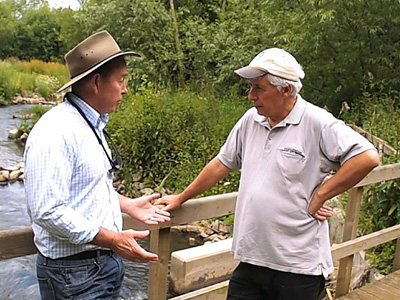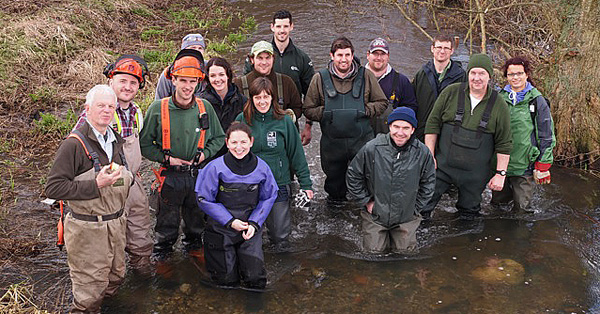Back in the day when men were men and political slogans still used verbs, the soon to be a two-term American president, Bill Clinton, put the words “It’s the Economy Stupid” on large banners that were displayed in all his campaign offices across the USA.
This was not so much a message to the American people but a reminder to his election workers and advisors of the importance of remaining focused on the key issue which would bring them success.
A few years later when I was asked to write the Keep Australia Fishing report for their boating and fishing tackle industry I shamelessly stole the Clinton words in order to emphasise the importance of protecting and improving habitat for recreational fisheries.
One of the key recommendations in my report sought to encourage angler involvement in habitat restoration:
“Most anglers recognise and support genuine environmental action to reverse habitat destruction, protect threatened species and change unsustainable fisheries and land use practices. We need to have recreational fishers fully engaged in promoting policies and programmes that benefit the aquatic environment on which our sport depends.”
It’s funny how, on occasions, simply penning a few well chosen words can lead to good things happening and lasting friendships. I can’t quite remember the sequence of events but at some point during the compiling of Keep Australia Fishing I was contacted by Craig Copeland, a Conservation Manager working for the New South Wales state government. We had lunch with Jim Harnwell in Sydney and so began my involvement with the Fishers for Habitat project.
 This was an excellent example of angling groups engaging positively with habitat restoration and fisheries protection and is a licence funded programme that had been operating successfully in NSW for a number of years. Here recreational fishers were rolling up their sleeves and helping to replace damaged and degraded habitats, removing barriers to fish migration and replanting the river edges to protect against erosion. Whilst this was pretty groundbreaking stuff in Australia, similar initiatives had been underway in the USA and Europe for some time.
This was an excellent example of angling groups engaging positively with habitat restoration and fisheries protection and is a licence funded programme that had been operating successfully in NSW for a number of years. Here recreational fishers were rolling up their sleeves and helping to replace damaged and degraded habitats, removing barriers to fish migration and replanting the river edges to protect against erosion. Whilst this was pretty groundbreaking stuff in Australia, similar initiatives had been underway in the USA and Europe for some time.
Nonetheless Fishers for Habitat has attracted international recognition and praise from leading US angler and conservationist Tom Sadler. Following his visit in 2009 he said:
“It is incumbent upon people involved in hunting and fishing to be good stewards of the land. It is in fact the true measure of what makes a good sportsman. Not just going out for a fish, but making the fishing better for future generations.
To be good stewards takes a lot of effort. It means giving time, money and energy to help restore the habitat that is vitally important. It means giving up something today so future generations can enjoy it, even if those who come later and enjoy the benefits of your sacrifice will never know it is you who deserves the thanks.”
Tom’s words still resonate as strongly today and directly led me to making common cause with Trout Unlimited and some of the other US based conservation groups of which he has been a part on important issues such as fracking.
Last year it was my pleasure to help host Craig on the UK part of his Churchill Scholarship tour to discover best practice and to find out what motivates anglers in the USA, Ireland and Britain to get involved with habitat restoration. As well as learning about the work of the Angling Trust and our partners, Fish Legal, in taking action against those who degrade habitat and pollute fisheries, Craig was able to visit the beautiful River Wye catchment in Wales and learn about some of their groundbreaking work which has seen salmon returning to the headwaters in ever increasing numbers. He had some particularly kind things to say about the efforts of our own Wild Trout Trust (WTT), who, although not an organisation as large as their American cousins, have done some superb work in getting volunteers into rivers on projects to reverse poor farming practices and improve in stream habitat for fish and other wildlife.
Here’s what he said of his UK visit:
“Probably the most interesting and useful thing that I saw was the role that recreational fishing based organisations and the Government agencies played to support recreational fishers that become energetic on the habitat front. The WTT and various Rivers Trusts are in place across the UK on behalf of fish, delivering outcomes on the ground to improve fisheries. By their presence and organisation they allow recreational fishers to become engaged on complex habitat issues that might if looked at by an individual seem insurmountable.”
For myself, having watched my own local River Kennet decline beyond recognition, I remain determined to try and engage my fellow fishers in fighting back. The Angling Trust has been working with WTT on a new Rivers and Wetlands Community Days programme to lever additional funding into habitat improvement work that gets angling and wildlife groups out in the countryside, installing woody debris and flow deflectors and helping to create productive spawning sites and fish passages to aid recruitment and migration.
Recently I was pleased to join my friend and colleague Del Shackleford, Fisheries Manager for Reading and District AA on a visit to the latest fry refuge that our local environment agency guys have installed on the Kennet at Padworth. It’s schemes like these that can make a real difference to tackling poor fish recruitment in our rivers. You can check out the video here..
I’m encouraged that across the planet recreation fishing groups are starting to learn from each other as we bang the drum ever louder for fish habitat. Craig Copeland, of course, wants us to go further.
He is working on setting up an International Fish Habitat Network – to connect people and organisations carrying out fish habitat work and hopefully make the task a little easier by sharing knowledge and best practice. Craig has recently launched an international survey with partner organisations in the UK, USA, Ireland and Australia to try and find out what best motivates anglers to get involved with habitat issues.

The problems facing fish and fishing are no respecter of international boundaries. We can only applaud the efforts of people like Sadler and Copeland who urge us on to put something back into the habitat on which our fishy world depends. Please take five minutes of your time to complete the survey HERE
You can even enter a prize draw on completion of the survey to win some free clothing from the Angling Trust online shop.
Note: This article first appeared in the international publications Classic Angling and Fishing World and also forms part of Martin’s Angling Trust Fighting for Fishing blog and is reproduced in an edited form here on FishingMagic with his kind permission.










